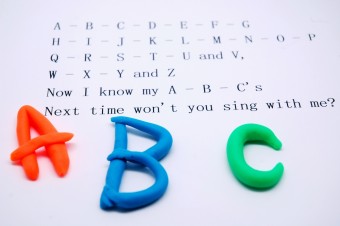The Alphabet Song is Based on a Tune by Mozart
 Today I found out the English “alphabet song”, also known as “The A.B.C.”, is based on a tune by Mozart, which in turn is based on a French tune, “Ah, vous dirai-je, maman” (“Ah! Would I tell you, mother?”), which popped up in 1761. A couple decades later, Mozart used this tune in his Twelve Variations on Ah, vous dirai-je, maman.
Today I found out the English “alphabet song”, also known as “The A.B.C.”, is based on a tune by Mozart, which in turn is based on a French tune, “Ah, vous dirai-je, maman” (“Ah! Would I tell you, mother?”), which popped up in 1761. A couple decades later, Mozart used this tune in his Twelve Variations on Ah, vous dirai-je, maman.
This same tune is also used as the basis for such children’s songs as Twinkle, Twinkle, Little Star and Baa, Baa, Black Sheep. In non-English tunes, such songs as the German Christmas carol Morgen kommt der Weihnachtsmann and the Hungarian Christmas carol Hull a pelyhes fehér hó also use this same tune.
Around a half a century after Mozart composed his Twelve Variations on Ah, vous dirai-je, maman an American music publisher named Charles Bradlee adapted the tune to fit with the English alphabet “lyrics” and copyrighted his “The A.B.C., a German air with variations for the flute with an easy accompaniment for the piano forte” song in 1835.
As you may or may not know, outside of North America, classically “z” is often pronounced “zed” rather than “zee”. This has created something of a problem as the pronunciation of “z” as “zee” has started to spread, much to the chagrin of elementary school teachers the English speaking world over. This has resulted in them often having to re-teach children the “correct” pronunciation of “z” as “zed”, with the children having previously learned the song and the letter the American English way from such shows as Sesame Street.
Naturally, kids are often resistant to this change owing to the fact that “tee, u, vee, w, x, y and zed, Now I know my A-B-Cs, Next time won’t you sing with me” just doesn’t quite sound as cohesive as “tee/vee/zee/me”.
Because of the problem at the end of the alphabet song with “zed” not really fitting, a variety of other endings have been created to accommodate this, such as this one: tu-v, w-x, y and z[ed], Sugar on your bread, Eat it all up, Before you are dead.
You can listen to the “Twelve Variations on Ah, vous dirai-je, maman” below:
If you liked this article and the Bonus Facts below, you might also like:
- Listening to Mozart Does Not Make You Smarter
- Why the British Pronounce “Z” as “Zed”
- “Ye” in Names Like “Ye Olde Coffee Shoppe” Should be Pronounced “The”
- The Origin of the QWERTY Keyboard
Bonus Facts:
- Putting new lyrics to an already existing melody or piece of music is known as a “contrafactum”.
- The Arabic alphabet song is called “Alif Ba Ta Tsa”.
- “Twinkle Twinkle Little Star” is based on a poem, “The Star”, written by then 23 year old Jane Taylor in 1806. She published the poem in “Rhymes for the Nursery“, which was written by herself and her sister Ann. The full poem is as follows:
- Twinkle, twinkle, little star,
How I wonder what you are!
Up above the world so high,
Like a diamond in the sky. - When the blazing sun is gone,
When he nothing shines upon,
Then you show your little light,
Twinkle, twinkle, all the night. - Then the traveler in the dark
Thanks you for your tiny spark,
How could he see where to go,
If you did not twinkle so? - In the dark blue sky you keep,
Often through my curtains peep
For you never shut your eye,
Till the sun is in the sky. - As your bright and tiny spark
Lights the traveler in the dark,
Though I know not what you are,
Twinkle, twinkle, little star.
- Twinkle, twinkle, little star,
- The first known instance of “zee” being recorded as the correct pronunciation of the letter “z” was in Lye’s New Spelling Book, published in 1677. There still was a variety of common pronunciations in North America after this; but by the 19th century, this changed in the United States with “zee” firmly establishing itself thanks to Noah Webster putting his seal of approval on it in 1827, and, of course, the alphabet song copyrighted in 1835, rhyming “z” with “me”.
- There is a backwards alphabet song composed by Wee Sing that goes like so: Z-Y-X-W-V-and-U–, T-and-S-and-R-and-Q–, P-O-N-M-L-K-J–, I-H-G-F-EDCBA– Now I know my CBAs, Next time won’t you lead the way.
| Share the Knowledge! |
|





When I repeat or sing “The Alphabet Song”, I end it as follows:
…Double-you and ex, wye, zee,
Or, as it is sometimes said,
Double-you and ex, wye, zed.
When I run it backwards, I say, starting with zee or zed,
Z Y X W V U T
S R Q P O N M
L K J I H G F
E D C B A, that’s all.
or sometimes E D C and B and A.